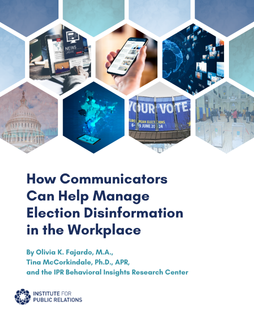This blog appears courtesy of the researchers Kaye D. Sweetser, Ph.D., San Diego State University, and Nicholas Browning, Ph.D., Indiana University. The full study can be found here.
Researchers Kaye D. Sweetser and Nicholas Browning recently published a study entitled Credibility or Credulity? Examining Political Organization-Public Relationships in an Election of Interloping Candidates, analyzing the effects of public relations on candidate preference and party relationship during the 2016 presidential primary.
The survey polled 493 people on their perceptions of their own party, their opposing party, and their assessment of credibility between the primary’s mainstream and interloper candidates.
In order to measure the relationship that parties have with their constituents, the study defined a political organization-public relationship (POPR) by two factors:
- Communicated commitment (CC): “communication in which members of an organization work to express their commitment to building and maintaining a relationship.”
- Conversational voice (CV): “an engaging and natural style of organizational communication as perceived by an organization’s publics based on interactions between individuals in the organization and individuals in publics.”
Surprisingly, people viewed their own party and their opposing party with similar POPR success. However, Democrats viewed their party with a higher CC than did Independents and Republicans. When asking about CC among an opposing party, Independents were viewed with more CC than were Democrats and Republicans. This leaves the Republican party with a lower perceived CC no matter party affiliation, showing that respondents feel the Republican party does not actively pursue relationship-building with citizens as much as the Democrat or Independent party.
Next, the study evaluated the dissatisfaction of Democrats and Republicans with one’s own party CC and CV and preference for interloping candidates. Interloping candidates were defined as candidates who had no political experience within the party, determined to be Bernie Sanders, Donald Trump and Ben Carson. Mainstream candidates, on the other hand, were candidates who had previous reputation with the party and were favored by party establishments, determined to be Hillary Clinton, Marco Rubio, Ted Cruz and John Kasich. Voters were asked to rate the credibility of these candidates on a scale of one to seven. The researchers expected support of interloper candidates to increase with dissatisfaction with one’s party, but they found:
- Democrats viewed interloper Sanders as far more credible than mainstream Clinton.
- Republicans ranked interloping and mainstream candidates fairly similarly.
- People who rated Trump as highly credible had lower CC scores with the Republican party, and those who rated him as average credibility had higher CV scores with Democrats.
- For every other Republican, the relationship with the opposition party was also significant.
- People who found Clinton highly credible had high CC scores with own party.
- People who rated Sanders as highly credible has worse CC and CV scores with the Republican party.
This shows that Democrats had a better relationship with their party, sporting a high CC relationship with their party when supporting a mainstream candidate and low scores with Republicans when supporting an interloper candidate. Republicans, though, had higher-scoring relationships with the opposition party than did Democrats. Republicans seemed dissatisfied with their relationship with their party, but they were content with their relationship with the Democratic party. The study sums it up perfectly: “Across the board, individuals appear satisfied with their relationship with the Democratic Party and dissatisfied with their relationship with the Republican Party, regardless of party affiliation.”
What does this mean for political public relations?
The study exemplifies how complex politics is, and how our expectations of how people vote cannot be put into a formula. The candidate who received the highest rating of credibility, Bernie Sanders at 5.30 out of 7, did not receive his party’s nomination. Donald Trump, with the lowest credibility rating at 2.81 out of 7, won the presidency. The party with the most stable constituency relationship, Democrats, lost the presidency to the party to Republicans, who experienced more dissatisfaction with their communication.
As credibility is such an important factor in building quality relationships between a consumer and brand, PR practitioners may be stumped on how to build a relationship with voters. For now, political communicators must still build credibility for their candidates, but may want to direct their focus on other exploits.





